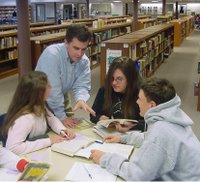Using Google Documents
For the last two days, we've utilized Google documents in class to put together a working definition of good literature. Occasionally, we struggled with the technology and the best way to use it.
The assignment was simple enough - brainstorm some criteria for what makes good literature and then write a more coherent paragraph definition. However, you had to complete the assignment as a group and you had to use Google documents to collaborate and work together. Educational experts have identified collaboration as a vital skill in today's society.
For our purposes in class, I'd like to know your reactions to the activity and the use of the technology. In your answer, consider the following guiding questions: What was difficult about using Google documents? In what ways (if any) did the technology help make the process easier? How did it challenge you? How could collaborative tools like this one could be used in our English class? Give some specific examples. How do you imagine that Google docs tools will be used in your future as a college student or as a member of the work force? What do we need to know and understand to be able to effectively use digital tools like this in the future?


